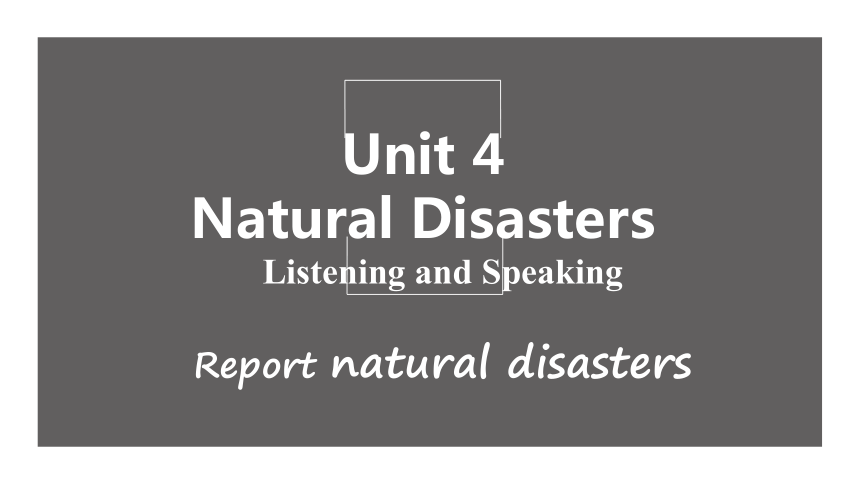(
课件网) Unit 4 Natural Disasters Listening and Speaking Report natural disasters Learning aims: After this class: 1. Can catch and understand some information of listening materials. 2. Master some words and phrases about description of natural disasters. 3. Know the language feature of a report and can report natural disasters; 4. Feel the power of unity towards natural disasters. Warming up What natural disasters does it mentioned Tornado Tsunami Earthquake Wildfire Flood Activity 1:Match the names in the video with the pictures If we want to get the information about natural disasters, what source can we find it from √ √ √ √ Activity 2: Listen to the four news reports and tick the disasters that you hear. √ News report 1 News report 3 News report 2 News report 4 Question Type of information Answer 1. What was the magnitude of the earthquake in Ecuador 2. How many people were killed or injured in Ecuador About _____ people were killed and more than _____ were injured. 7.8 230 1,500 News report 1 Tip: Think about what you are listening for before you listen: numbers, places, dates, times, activities, people or, reasons, etc. Activity 3:Circle the key words in the questions below and write the kind of information they refer to. number number ['ekw d (r)'] Listen again and fill in the blanks. Pre Listening How do these natural disasters affect(影响) our life What may happen in these disasters destroy kill injure damage survive rescue In a disaster, people may be _____ or _____ and homes may be _____or _____. Some people may die, while some may _____. With the help of _____ workers, the city will _____ again. revive 复兴,恢复 killed injured damaged destroyed survive rescue revive Report natural disasters Lead in Match the pictures with the natural disasters. earthquake___ tsunami___ volcanic eruption___ sandstorm___ drought___ hurricane/typhoon___ landslide___ tornado___ wildfire___ flood___ 1 2 3 4 5 10 9 8 7 6 3 2 10 6 7 9 8 1 4 5 Circle the key word(s) in the questions below and write the kind of information they refer to. Then listen again and answer the questions. Listen for details Think about what you are listening for before you listen: numbers, dates, times, addresses, activities, people or places, reasons, etc. Use key words and phrases in the question as alerts to help you find information. (Key words are important words relevant to the thing you’re listening for.) Take bullet-point notes to help you remember everything. Question Type of information 1. What was the magnitude of the earthquake in Ecuador number 2. How many people were killed or injured in Ecuador 3. Where are the floods 4. What are the rescue workers and soldiers doing in the flood-hit area 5. When did people see the tornado in Memphis 6. Which buildings were damaged in Seoul 7. What caused the landslide in Seoul number place activities time places reasons number 1. What was the magnitude of the earthquake in ... ...

